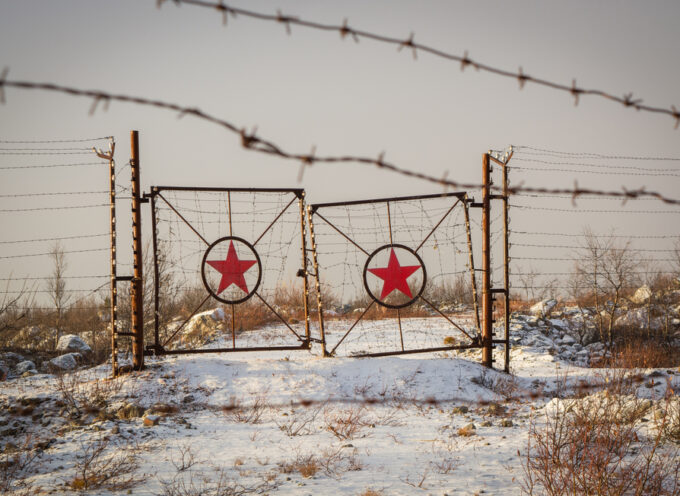Nearly two weeks ago, Russia launched a military strike against Ukraine, referring to it as a “peacekeeping mission.” However, the international community has united around its clear-eyed understanding that Russia’s actions are more than a mere peacekeeping mission: Russia wishes to glorify itself, either by enlarging its borders or by installing a pro-Russian government.
Although Putin’s invasion is an egregious violation of agreed-upon laws of justifiable warfare, he has made at least four arguments in its favor. He claims that Ukraine is engaged in genocide against ethnic Russians in the Donbas region. He asserted that Ukraine is not a sovereign nation; He argued that Russia’s invasion is an act of self-defense against encroaching Western powers. Fourth, he speculated that Ukraine is acquiring nuclear weapons for potential use against Russia.
The Russian military’s invasion of Ukraine clearly is unjustifiable. Rather than striking Ukraine to correct a specific injustice—which, under the consensual Western ethic of warfare, would enable Russia legitimately to wage war—Putin justified its invasion with ambiguous claims and false justifications.
Putin’s claim that Ukraine is not a sovereign nation is manifestly false. His claims about encroaching Western power expansion are irrelevant; he cannot point to any specific injustice committed by the West. His speculation that Ukraine will use nuclear weapons against Russia is just that—merely conjecture. And even if his claim were true about ethnic genocide against Russians in Donbas, those claims do not justify a full-scale invasion. Thus, Russia does not have just cause to enter a war with Ukraine.
Similarly, Putin is waging war with malicious intent. In justified warfare, “right intent” involves going to war in order to restore a previous state of peace. Instead, it seems clear that Russia intends to expand the Russian empire, send a gastly message to the West, and punish Ukraine for a speculative scenario which has yet to unfold.
Putin’s egregious violation of international laws of warfare should not go unpunished. As this series of short articles outlines, nations must be held morally accountable when they shed blood unjustifiably. Thus, Western powers should urge their nation’s leaders to persistently and resolutely oppose Putin’s endeavor to shed Ukrainian blood.
However, the question remains: should the United States and its NATO allies, intervene militarily? The short answer is no. In order for Western powers to enter the war, eight questions need to have been answered in the affirmative. At least two, and maybe three, of those questions cannot be answered affirmatively.
The eight questions are:
Is there a justifiable cause? In this instance, yes, there is a justifiable cause: to correct a specific injustice committed by Russia and to restore peace and order in Ukraine.
Is there a legitimate authority? Yes. A war is just only if the decision is to wage war is made by the political leader or civil body ultimately responsible for maintaining order and providing security. Thus, legitimate authorities of Western nations could make such a decision.
Is there right intent? Yes. The only justifiable intent is to restore a previous state of peace. It is never morally right to wage war for the purposes of enlarging one’s territory or humiliating one’s enemy. Thus, Western powers could intervene to help Ukraine restore the peace.
Do the moral merits of waging war outweigh Russia’s moral merits for invading? Yes. Western powers could justify intervening in the conflict because the merit of restoring peace far outstrips any merit in Russia’s merit in re-annexing its lost “cousins.”
Is military intervention a last resort? Unsure. In order to justify entering the war, Westerns powers would need to determine whether all reasonable nonviolent options have been considered and exhausted. Western military leaders together would need to determine if they had exhausted all other reasonable options.
Is there a reasonable chance of winning? No. War is not justified if an attempt to win the war would clearly be futile. Western leaders would not have a realistic chance of victory. Russia would match and exceed the type of resources Western leaders would be willing to devote.
Would the results be proportionate to the effort? No. A war can only be justified if the good a nation expects to achieve upon winning the war are greater than the estimates of what it will cost to achieve the victory. If Western powers intervened militarily, they almost surely would trigger a third World War, the consequences of which would be devastating.
Would the war be waged with the right spirit? Yes. A nation cannot justify waging war out of glee or hatred. Western leaders could wage war from a sense of duty, recognizing that war is sometimes necessary but, even when so, it is always a tragic necessity.
These eight questions arise from the “just war” tradition, which stretches back thousands of years and has been formulated over the centuries by military, political, and religious leaders. These are the principles upon which the United States bases its Laws of Land Warfare and Rules of Engagement, and on which the international community bases its international laws of warfare.
At least two, if not three, of these questions cannot be answered in the affirmative, and thus citizens of Westerns nations should refrain from entering the war militarily.
Subscribe
Never miss a post! Have all new posts delivered straight to your inbox.








Of course, politics mitigates and overrides any “moral” considerations. Additionally, in this case, as in Bosnia earlier, the European powers need to step up to the plate. But, they have spent decades relying on the US for their security, a security they can easily afford and accomplish now. We need to let them handle their responsibilities. In world affairs, the US, outside of any direct considerations, should only intervene where there is no one else that can or will. We should not have been in Bosnia but we should have been in Rwanda.
As far as Russia’s military power, it is looking like it is a false fear. The abilities they demonstrated in WWII was due to the fact that we were funneling material to them to keep them alive and fighting. The only serious key to fighting Russia is to not go into their territory. Fight them at the border and no further.
Given the above 8 criteria, it would seem that no war is ever justifiable since, for example, the cost nearly always outweighs any moral considerations and since a “chance of winning” means that “might is always right”. As far as God is concerned, his might is always greater, always right, and always wins, no matter the cost. Perhaps this is where the command from Jesus to “Deny yourself, take up your cross, and follow me” comes in.
Put simply, we are all so afraid of death that it still holds us captive. Christ having come to set us free from the fear of death seems to now be irrelevant, even to the Christian Church. Watching the death/murder of widows and orphans is a direct breach of GOD’S LAW, and man’s law is irrelevant in comparison.
When did “Deny yourself” only become applicable to Ukrainians and not to Christians? When did “Take up your cross” cease to mean that we be prepared to sacrifice our lives for the lives of others? When did “Follow me” become an excuse to participate in the erosion of our very humanity as we avidly watch horrors on our TV’s every day and refuse to do anything to effectively stop it. How long will it be before we become so hard hearted that we are no longer granted the ability to repent? We ALL KNOW when something is just plain wrong. We ALL KNOW when we should be doing something effective. We ALL KNOW when we are being cowards – and God hates a coward.